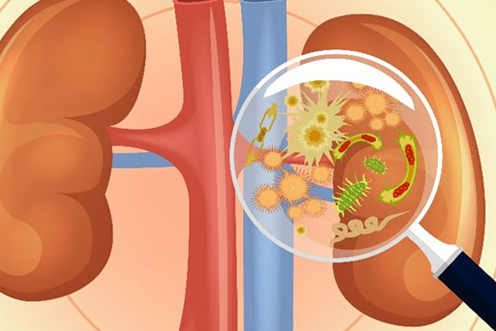Kidney Infections
Kidney infections, also known as pyelonephritis, are a type of urinary tract infection (UTI) that affects one or both kidneys. Understanding kidney infections is crucial for early diagnosis and effective treatment.

What are Kidney Infections?
Kidney infections occur when bacteria or viruses enter the kidneys and multiply, causing an infection. This condition can be painful and lead to serious complications if left untreated.
Causes and Risk Factors of Kidney Infections
Kidney infections are typically caused by bacteria entering the urinary tract and reaching the kidneys. Risk factors for kidney infections include:
- Urinary tract obstructions: Such as kidney stones or enlarged prostate.
- Compromised immune system: Due to conditions like diabetes or HIV/AIDS.
- Structural abnormalities: In the urinary tract that make infections more likely.
- Female anatomy: Women are more prone to kidney infections due to the shorter urethra.
Symptoms of Kidney Infections
Symptoms of kidney infections may include:
- Fever and chills: Often accompanied by sweating.
- Flank pain: Pain in the back or side, typically on one side.
- Frequent urination: With a persistent urge to urinate.
- Painful urination: A burning sensation during urination.
Types of Kidney Infections
There are two main types of kidney infections:
- Acute Pyelonephritis: A sudden and severe infection of the kidneys.
- Chronic Pyelonephritis: A persistent or recurring infection that can cause permanent kidney damage over time.
Diagnosing Kidney Infections
Diagnosing kidney infections involves a combination of medical history, physical examination, urine tests, and imaging studies. Urine tests can detect the presence of bacteria and white blood cells, while imaging studies like CT scans or ultrasounds can help evaluate the kidneys' condition.
Treatment Options for Kidney Infections
Treatment for kidney infections typically involves:
- Antibiotic Therapy: Oral antibiotics are usually prescribed to treat the infection.
- Hospitalization and IV Antibiotics: In severe cases, hospitalization and intravenous antibiotics may be necessary.
Preventive Measures for Kidney Infections
Preventive measures for kidney infections may include:
- Staying hydrated: Drinking plenty of water to flush out bacteria from the urinary tract.
- Urinating after intercourse: To help flush out bacteria.
- Avoiding irritants: Such as perfumed products or harsh soaps in the genital area.
Complications of Untreated Kidney Infections
Untreated kidney infections can lead to serious complications, including:
- Kidney damage: Chronic kidney infections can cause scarring and permanent damage to the kidneys.
- Sepsis: A life-threatening infection that can spread throughout the body.
Diet and Lifestyle Recommendations
Following a healthy diet and lifestyle can help prevent kidney infections. This includes:
- Maintaining good hygiene: Especially in the genital area.
- Eating a balanced diet: Rich in fruits, vegetables, and whole grains.
- Avoiding smoking: Which can impair immune function.
Hyderabad MultiSpeciality Hospital's Approach to Treating Kidney Infections
At Hyderabad MultiSpeciality Hospital, we offer comprehensive care for patients with kidney infections, provided by a team of urologists, nephrologists, and infectious disease specialists. Our approach focuses on early diagnosis, effective treatment, and preventive measures to reduce the risk of recurrence.
Innovative Treatment Technologies
Our hospital is equipped with state-of-the-art technologies for the diagnosis and treatment of kidney infections. These include advanced imaging modalities, such as CT scans and ultrasounds, as well as minimally invasive procedures for the management of kidney infections.
Patient Experiences and Success Stories
Patient experiences and success stories highlight the positive outcomes of our treatment for kidney infections. These stories provide hope and encouragement to others facing similar challenges and demonstrate the effectiveness of our care.
Support and Resources for Kidney Infection Patients
We understand that managing kidney infections can be challenging, both physically and emotionally. That's why we offer a range of support services to help patients and their families cope with the demands of the condition. Our support services include counseling, support groups, educational resources, and financial assistance programs.
Managing Recurrence of Kidney Infections
For patients who have experienced kidney infections, preventing recurrence is crucial. Our team works closely with patients to develop personalized prevention plans, including dietary and lifestyle recommendations, to reduce the risk of future infections.
FAQs About Kidney Infections
1. Can kidney infections be prevented?
Yes, kidney infections can often be prevented by practicing good hygiene, staying hydrated, and avoiding irritants in the genital area.
2. Are kidney infections contagious?
No, kidney infections are not contagious. They are typically caused by bacteria that are already present in the urinary tract.